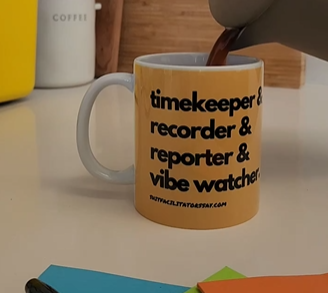
Photo Credit: Instagram
Small group dynamics play a crucial role in the success of discussions, projects, or activities. Assigning specific roles like Timekeeper, Recorder, Facilitator, and Vibe Checker can truly enhance the group’s productivity, inclusivity, and overall success. So, what do these roles involve?
Timekeeper: Staying on Track
The Timekeeper doesn’t only yell “5 more minutes!” They also help to ensure that the group stays focused on critical issues, helping allocate appropriate time to each agenda item. If the topic is more complex or nuanced than initially anticipated, the Timekeeper may also ask for more time, when its critical to help ensure the group’s needs are met. Without a Timekeeper, discussions can easily veer off course, leaving important topics unaddressed.
Recorder: Collecting Key Insights
Small group discussions often produce valuable ideas, insights, and decisions not gathered in the larger group. They can also offer a safer space for participants who may be hesitant to share in a larger setting. The Recorder’s job is to document these key points, ensuring that nothing is overlooked. This accurate documentation holds the group accountable and provides a clear reference for future actions. By clarifying what was discussed, the Recorder helps reduce the chances of miscommunication and ensures that everyone in the group has a shared understanding.
Facilitator: Guiding the Process
The Facilitator in a small group guides the process and ensures that everyone’s voice is heard. If there are community agreements as part of the session, the small group Facilitator helps the group maintain them. This role is crucial for maintaining structure, encouraging participation, and steering the group towards its goals. The participant in this role may also note any conflicts that arise, fostering a more equitable environment where diverse perspectives are valued.
Vibe Checker: Monitoring the Emotional Pulse
This role is often skipped and/or undervalued. However, the emotional tone of the group can significantly impact how participants engage. The Vibe Checker monitors the group’s emotional dynamics, ensuring that the environment remains conducive to collaboration. They are the ones noticing if someone has shut down, what the power dynamics feel like etc. By being mindful of psychological safety, the Vibe Checker helps participants feel included and valued. They can also prevent burnout by keeping the group focused and motivated.
Even with our best efforts, it's impossible to catch everything happening within a group. Assigning specific roles like Timekeeper, Recorder, Facilitator, and Vibe Checker not only helps us keep track of the process but also empowers participants by giving them clear responsibilities that boost focus, accountability, and collaboration. These roles safeguard the group's values, ensuring that everyone has a voice, discussions stay on track, key insights are preserved, and the emotional atmosphere is maintained. I can’t imagine facilitating a small group without them!


